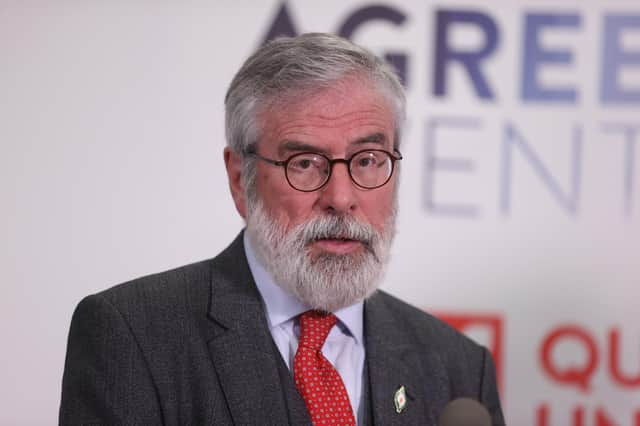Letter: Legacy Bill amendment restores a fundamental rule of constitutional law and will prevent Gerry Adams from receiving compensation


On Tuesday night, in the third reading of the Northern Ireland Troubles (Legacy and Reconciliation) Bill, the House of Lords accepted an important government amendment that will reverse the damaging legal effects of the Supreme Court’s judgment in R v Adams [2020] UKSC 19.
The amendment makes clear that the Supreme Court’s judgment, allowing an appeal by Gerry Adams against his 1975 conviction for attempting to escape from lawful custody, was wrongly decided. When the bill is enacted and comes into force, it will prevent Gerry Adams from receiving compensation in reliance on the 2020 judgment and will restore a fundamental rule of constitutional law that the Supreme Court’s judgment needlessly unsettled.
Advertisement
Hide AdAdvertisement
Hide AdThe Supreme Court had ruled that legislation enacted in 1972 required the secretary of state personally to exercise the power to detain persons suspected of involvement in terrorism and that it was thus unlawful for a minister of state to exercise this power on the secretary of state’s behalf. In an authoritative paper, published in 2020, Policy Exchange showed that the Supreme Court’s judgment was clearly wrong. The argument of that paper has been raised on a number of occasions in the House of Lords since then and has now been accepted by government and Parliament.


The effect of the Supreme Court’s judgment was to open the door to Gerry Adams, and to other persons detained in the 1970s for suspected involvement in terrorism, wrongly to seek damages for false imprisonment and/or to claim compensation for wrongful conviction. The judgment also undermined the Carltona principle, the fundamental rule that powers conferred on a secretary of state may be exercised by junior ministers or senior officials acting on his or her behalf. In its 2020 paper, and in four other papers between 2020-2022, Policy Exchange argued that Parliament should legislate as soon as possible to reverse the judgment and correct the law.
An amendment to the Bill to reverse the legal effects of the Supreme Court’s judgment was first advanced by Lord Godson, director of Policy Exchange, and Lord Faulks KC, former justice minister. Their amendment, which was grounded in Policy Exchange’s 2020 paper, was debated at committee stage on 11 May, with many peers expressing strong support for it. The government reserved its position. On 23 June, Policy Exchange published a paper making the case for the Faulks/Godson amendment and answering two objections that it anticipated might wrongly be made against it. The paper was supported by a very distinguished set of peers, from all parties and none, in a joint foreword and the government accepted the principle of the amendment at report stage on 26 June, committing to bringing back its own amendment at third reading.
The government’s amendment has now been accepted by the House of Lords. Policy Exchange welcomes this very important legal development, which follows from our criticism of the Supreme Court’s dubious judgment and which will (a) prevent public funds wrongly being paid in relation to detention that was in fact entirely lawful and (b) restore a fundamental rule of constitutional law which the Supreme Court in 2020 wrongly put in doubt.
Richard Ekins KC (Hon), professor of law and constitutional government, St John's College, University of Oxford